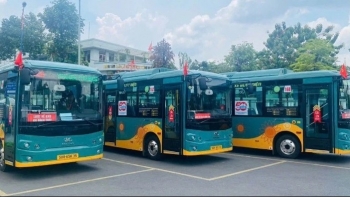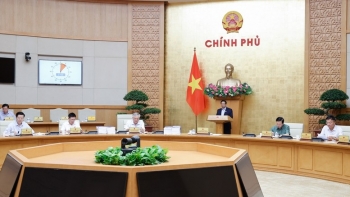 |
| The 2% reduction in VAT has helped businesses promote production and business. Photograph: TL |
Diminish the integration of social policies into tax policy
Previously, when commenting on the draft resolution on value-added tax remission (VAT) at the 23rd session of the Standing Committee of the National Assembly (the Standing Committee of NA), the Standing Committee of the NA directed to continue implementing the 2% VAT remission policy as stipulated in Resolution No. 43/2022/QH15, rather than expanding the application to all types of goods and services as proposed by the Government.
The National Assembly is concerned that expanding the tax remission policy will exert a negative influence on budget revenue, especially as the budget revenue situation in 2023 is limited, aggregate demand is weak, and business health is deteriorating. The Standing Committee of the NA requests that budget revenues not be reduced under approved budget estimates and that the budget deficit not be increased by 2023.
During a recent working session between Finance Minister Ho Duc Phoc and local officials on the situation of production and business, public investment, import, and export, local officials expressed their concern that tax policies, fees, and charges to support citizens and businesses may affect local budget revenues.
Supportive policies are critical in the context of hard times. However, many economists and representatives of international organizations have warned against incorporating social policies into tax policy, which could erode the tax base. Because some revenues are paid to the local budget, current tax, fee, and charge reduction policies have a direct impact on local budget revenues.
| Effective implementation of collection management solutions To overcome and offset the short-term impacts on state budget revenues, as well as to maintain the initiative in operating the estimated state budget, the Government has directed the Ministry of Finance to coordinate with relevant ministries, branches, and localities to focus on directing the effective implementation and implementation of tax laws; continue to reform the modernization of the tax system, simplify tax administrative procedures; and, simultaneously drastically manage budget revenues, focus on timely and effective implementation of solutions for revenue management, revenue loss prevention, transfer pricing, and tax evasion. |
Even though there are remaining difficulties, some industries are growing and can share responsibilities and difficulties among the State, individuals, and businesses.
As a result, the Government proposed in a recent report that the tax remission will not apply to certain groups of goods, including telecommunications, information technology, finance, banking, securities, insurance, real estate business, metals, precast metal products, mining products, refined petroleum, chemical products, and items subject to excise tax. It is the policy that implemented in 2022.
The growing economy will contribute to the budget
According to the Government, the 2% VAT remission (excluding sectors such as telecommunications, banking, insurance, securities, real estate, and so on) in 2022 has supported businesses and individuals to the tune of VND 44,500 billion, contributing to lower prices for goods and services, promoting production and business, creating more jobs for workers, thereby stimulating consumer demand, and increasing revenue for the state budget. The implementation of VAT remission under Resolution 43/2022/QH15 has indirectly stimulated high domestic consumption, with total retail sales of goods and consumer service revenue rising by 19.8% in 2022 compared to the previous year. Domestic VAT collection has increased by 10% over the same period. If this policy takes effect this year, the budget is anticipated to be cut down by VND 24,000 billion.
According to the Ministry of Finance, in addition to maintaining 2% VAT remission, it is essential to work out solutions implemented in 2023 (including the extension of the due date for paying taxes and land rent; land rent reduction; reduction of environmental protection tax for gasoline and oil products; exemption and reduction of fees and charges), in line with the current economic context, to support individuals and businesses as soon as possible. As a result, it will encourage production and business activities to quickly recover and develop, thereby contributing to the state budget and the economy.
The challenge and skill in management are that fiscal policy must support businesses and the economy without affecting budget revenues to ensure the source for tasks listed in the estimate as well as for urgent tasks that may arise.
The Ministry of Finance has gained management experience and achieved success over the years. Nevertheless, the context changes each year. Therefore, it is necessary to remain flexible, creative, and skillful in management. This demonstrates the bravery, intelligence, and breadth of vision of the leaders of the Ministry of Finance, the Government, and the Prime Minister.
According to Minister Ho Duc Phoc, the Ministry of Finance will place a greater emphasis on state budget collection, strengthen inspection management, reform administrative procedures, encourage collection and payment, and strive to increase revenues in areas and fields to compensate for reduced revenue due to policy implementation.
At the same time, it is essential to continue to restructure the state budget as part of the aggregate economic restructuring, which is linked to the renewal of the growth model, the mobilization, allocation, and efficient use of financial resources to support socio-economic development, strengthen internal resources, improve the economy's resilience and adaptability and ensure national financial security.
| Budget expenditure needs to be more economical and more efficient The Ministry of Finance claims that numerous measures will be implemented simultaneously with the restructuring of revenues to boost budget revenue, keep the state budget's expenditure under strict control, and thoroughly save for recurrent expenses. Furthermore, according to Government Resolution No. 50/NQ-CP dated April 8, 2023, ministries and central agencies which have not allocated the assigned estimates by the end of June 30, 2023, proactively use reserves, and other legal resources to prevent and control natural disasters, epidemics, and urgent tasks arising under regulations. The Ministry of Finance has set the goal of implementing a state budget revenue and expenditure structure over the last term. This issue is becoming more urgent during the Covid-19 pandemic when “expenditure has surpassed revenue”. It thus calls for participation from budget levels. Budget expenditure also needs to be more economical and more efficient. In terms of administration, the Ministry of Finance proposed that all budget levels must spend the state budget strictly and thriftily. At the same time, it is necessary to accelerate the disbursement of public investment capital, creating a driving force to promote economic growth; thoroughly save recurrent expenses, and cut expenses that are not really necessary, and slow to implement. Moreover, it is essential to recuperate recurrent expenditures allocated to ministries, central and local agencies but not yet allocated, or allocated but not yet deployed, regular funds which are not really necessary to supplement central and local budget reserves to spend on urgent arising tasks. The Ministry of Finance requires provinces to proactively plan, cut down, and ease unnecessary expenditures. Additionally, if revenue is reduced, corresponding expenditures must be decreased. This is the right direction for the Ministry of Finance to continue to implement more thoroughly in this term. The public overwhelmingly supported these solutions to restructure revenue and expenditure tasks. In interviews with Vietnam Finance Plus, many National Assembly deputies praised the efforts of the Government and the Ministry of Finance in restructuring the state budget, particularly in saving budget expenditures. It has been suggested that the implementation of preferential tax policies should be careful. In addition to reviewing and eliminating incentives that are no longer appropriate, it is also necessary to avoid spreading incentives, focusing only on incentives for key industries and professions, or especially encouraging or investing in areas that require incentives. At the same time, tax incentives should be applied consistently in the medium and long term, limiting frequent changes that affect business plans and outcomes, as well as business investment strategies./. |





















































